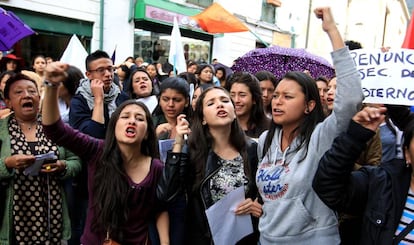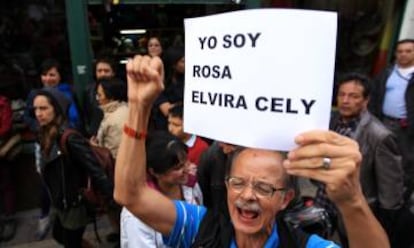“No more femicides, we’re all Rosa Elvira”
Protestors gather at Bogotá City Hall after authorities blame woman for causing her own death


An official at Bogotá City Hall has resigned and Mayor Enrique Peñalosa has retracted his statement blaming Rosa Elvira Cely for her rape and murder in 2012, but activists are holding a series of vigils to highlight the continuing scourge of gender-based crimes and the Colombian capital’s negligent handling of the case. On Monday afternoon, dozens of people gathered before City Hall shouting: “No more femicides, we’re all Rosa Elvira.”
“This is a demonstration for Rosa Elvira Cely and against the bureaucratic insults that require us to break the silence,” one demonstrator said. The protest was the first of a series planned for this week in Bogotá, a city where, according to the Ombudsman’s Office, at least 21,000 women have been victims of gender-based violence in the two years following Cely’s death.
The protest was organized after City Hall issued a statement inferring the victim was largely to blame for her death. “She put her well-being and life at risk to the point where Javier Velasco cut off her existence; if Rosa Elvira Cely had not gone out with two classmates at night after she finished her classes, we would not be grieving her death today,” the former mayor said in a statement responding to accusations that the authorities were negligent in their response to the victim’s call for aid after the attack.
Rosa was found two hours after she called the emergency services. Her body showed signs of hypothermia and several stab wounds
UN Women says the case is a clear indication of the institutional impunity that allows violence against women around the world and that Cely’s plight has led to an important debate about how Colombia deals with gender-based crimes. “Until there is an alignment between the law and its appropriation by public servants in charge of its application, the country will not see fundamental advances in the eradication of this avoidable scourge of violence against women,” the UN said. According to Medicina Legal, the country’s forensic institute, more than 8,000 women were killed in Colombia between 2009 and 2014.
Cely’s case shook the nation when the details of how she was tortured were revealed four years ago and it continues to anger many Colombians. Adriana Cely, the victim’s sister, recalls the series of mistakes that led to Rosa’s death. “Although she was able to call for help, they let her die. The authorities took a long time to get there and once in the hospital she did not receive the care she needed,” Adriana told EL PAÍS.

Rosa was found two hours after she called the emergency services. She was naked and lying on the grass in a park in downtown Bogotá. Her body showed signs of hypothermia and several stab wounds. The doctors said she died of peritonitis because her attacker stabbed her with a wooden stake in the abdomen. “What we feel today is like going back to four years ago. We feel the same pain, the same impotence, the same sadness,” Adriana says.
Rosa Elvira Cely’s family has also condemned the fact that her attacker, Javier Velasco, has been freed even though police records show that he had killed another woman before and abused two of his stepchildren.
“I don’t understand how they can expect abused women to report [assaults] if the authorities see them as the culprits,” Adriana Cely says. Last year, she sued the city for its negligent handling of her sister’s case.
English version by Dyane Jean-François.
Sign up for our newsletter
EL PAÍS English Edition is launching a weekly newsletter. Sign up today to receive a selection of our best stories in your inbox every Saturday morning. For full details about how to subscribe, click here.
Tu suscripción se está usando en otro dispositivo
¿Quieres añadir otro usuario a tu suscripción?
Si continúas leyendo en este dispositivo, no se podrá leer en el otro.
FlechaTu suscripción se está usando en otro dispositivo y solo puedes acceder a EL PAÍS desde un dispositivo a la vez.
Si quieres compartir tu cuenta, cambia tu suscripción a la modalidad Premium, así podrás añadir otro usuario. Cada uno accederá con su propia cuenta de email, lo que os permitirá personalizar vuestra experiencia en EL PAÍS.
¿Tienes una suscripción de empresa? Accede aquí para contratar más cuentas.
En el caso de no saber quién está usando tu cuenta, te recomendamos cambiar tu contraseña aquí.
Si decides continuar compartiendo tu cuenta, este mensaje se mostrará en tu dispositivo y en el de la otra persona que está usando tu cuenta de forma indefinida, afectando a tu experiencia de lectura. Puedes consultar aquí los términos y condiciones de la suscripción digital.








































